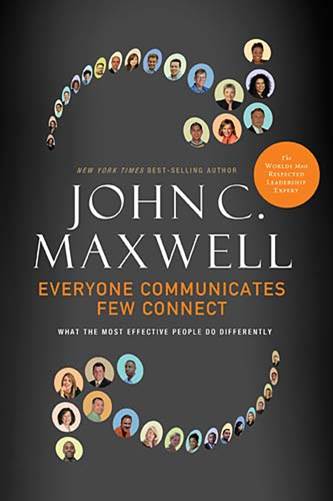What the Most Effective People Do Differently
John Maxwell -- internationally-respected leadership expert, speaker and author -- says that anyone can learn how to make every communication an opportunity for powerful connection. He describes eight principles and eight practices for communicating one-on-one, in small groups, and with an audience. Maxwell excels at quips and illustrations.
You know when you don't have a good connection on the phone, but how about when you're communicating with people in person? You can tell you've connected when people put in extra effort, offer unsolicited appreciation, demonstrate trust through openness, express themselves more readily, and so on.

The 10 Principles to communicate in any situation :
Part 1 : Connecting Principles
Connecting Increases Your Influence in Every Situation
"Connecting is the ability to identify with people and relate to them in a way that increases your influence with them."
You must take the initiative, be proactive. And it's not just more talk. It begins with an attitude of valuing other people.
One to one: Talk more about the other person and less about yourself. Come with good questions. Ask if there is a way you can help them. And follow through. Group: Look for ways to compliment people in a group. Look for ways to add value. Avoid taking credit and casting blame. Celebrate the successes of the group. Audience: Let them know you are excited to be with them. Let them know they add value to you.
Connecting Is All About Others
Get over yourself. "Maturity is the ability to see and act on behalf of others."
People know if you really care about them. "Nobody wants to be sold, but everyone wants to be helped."
Focus on helping people with their needs rather than the features of your product. Every feature must be translated into a benefit. When you talk to a sales person, you ask three questions:
Do you care for me?
Can you help me?
Can I trust you?
When people take action, they do so for their reasons, not yours. Connecting begins when the other person feels valued. Listen to them. Find out what they value. Share your values that are similar to theirs. Build your relationship on common values
Connecting Goes Beyond Words
It includes tone of voice and body language. In communicating, include thought, emotion, and action, i.e. something you know, something you feel and something you do. If any are missing, communicating is exhausting. "Any message you try to convey must contain a piece of you."
When I speak,
- Did I do my best? (integrity)
- Did I please my sponsor? (expectation)
- Did I understand and relate to the audience? (relevance)
- Did I add value to the people? (value)
- Did I give people a game plan? (application)
- Did I make a difference? (change)
We must connect visually, intellectually, emotionally, and verbally. Eliminate distractions such as inappropriate dress, tics, or other personal nuisance habits. Expand your range of expression. Smile. Move with a sense of purpose. Keep your physical and mental posture open. Remove obstacles and reduce distance. Pay attention to your surroundings. Speak out of your own experience. "Whatever is inside of you, whether positive or negative, will eventually come out when you are communicating to others."
"The colossal misunderstanding of our time is the assumption that insight will work with people who are unmotivated to change. … People can only hear you when they are moving toward you, and they are not likely to when your words are pursuing them."
"People may hear your words, but they feel your attitude."
"They will not always remember what you did. But, they will always remember how you made them feel."
Be positive, believe in yourself, and focus on others. Convey your confidence in them.
Connecting Always Requires Energy
"I've learned that if you want people to be impressed, you can talk about your successes; but if you want people to identify with you, it's better to talk about your failures."
The four communicator sins are being unprepared, uncommitted, uninteresting, or uncomfortable. Each shows a lack of energy. Make others comfortable. Appear confident. Laugh at yourself. Show interest in others. Lean into greetings. Convey enthusiasm. Use stories. Convey respect and show that you genuinely like the people. Take the initiative with people. Add value to them. Prepare. When you are asked to speak, find out about the audience: Who are they? What do they care about? Where are they from? Why are they here? What can I offer them?
Give of yourself. There are givers and takers in life. Which are you? If communicators teach out of need, insecurity, ego, or even responsibility, they are not giving. They are trying to "take" praise, approval, acceptance, or something the audience must give. The giver teaches out of love, grace, gratitude, compassion, and passion. The teaching becomes a gift that fills and renews.
Giving requires stamina. Find out what recharges your batteries and make it part of your schedule.
One-to-one. Gear up for it mentally and emotionally as you would for an audience. Groups: Sometimes they bring the energy and sometimes you must supply it. Audiences: The larger the crowd, the more energy you must provide in the form of passion, conviction, and believing in people.
Connecting is More Skill than Natural Talent
"The greatest problem in communication is the illusion that it has been accomplished."
Your credibility comes from several sources, including who recommends you, what you know, what you have done, what you can do, and how you have lived.
The following things are said about the author by his associate and writer, Charlie Wetzel. John is genuine. He has great confidence and exhibits authenticity. He always prepares thoroughly. He reads voraciously and constantly files quotes and illustrations. He carries a few speech outlines with him, just in case. He is humorous and laughs at himself. He meets and greets people beforehand and hangs around to meet people afterwards. His others-mindedness is a hallmark. He understands people and wants to help them. He makes them feel wanted. He looks for ways to add value to people.
Part 2 : Connecting Practices
Connectors Connect on Common Ground
This requires understanding others. "If you can learn to pinpoint how those around you experience the world, and really try to experience the same world they do, you'll be amazed at how effective your communication will become."
Build upon agreement. Miscommunication arises because of mistaken assumptions about others, especially when generalizations replace observations. Watch for the clues. Some people think they already know what others feel. Others think they don't need to know. Still others don't care to know. "Indifference is really a form of selfishness."
While it is important to understand others, it's also important for finding common ground to let others in on what you believe and feel. Finding common ground takes time, intentionality and availability to others. Pay attention. "Anytime you are willing to listen to others and figure out how the thing you're offering fills their needs, you've found a way to reach common ground."
Ask questions. Be curious. Ask 'why?' Think of others and thank them. Let people into your life. What people want as much as anything is to be heard. Listen. "Connection always requires both parties to engage and be open."
If people like you they will listen to you. When others know you care, they'll listen.
First move to where they are. Adapt to others and see from their point of view. Try to move to their world mentally. Start where they are. See through their eyes before asking them to see from your perspective. Connect with their feelings first. "Only after I know what they know, do I try to share my side of the story."
Connectors Do the Difficult Work of Keeping It Simple
The job is to bring clarity, not complexity. If you can't explain it simply, you don't understand it well enough. But it's hard work. Talk to people, not above them. Ask two questions: "What do I want them to know?" and "What do I want them to do?" People want to know the bottom line. Give it to them. Repetition is essential. Repetition is essential. Go for brevity, levity, and repetition. Say less, not more. End a little early.
To be sure you have been effective:
Ask for feedback.
Ask people in the group to share what they have learned.
Ask the group to tell how they are going to pass what you've said on to others.
"What are the bare essentials that I need to communicate for people to understand it?" and "How can I make those few essential points memorable?"
Connectors Create an Experience Everyone Enjoys
For speaking, collect quotes, stories, and illustrations. Do not be boring. Your first responsibility is to gain and keep attention. Say things from their perspective. Meet them in their world. "People don't remember what we think is important; they remember what they think is important." (178) Avoid abstract terms and make what you say personal. You don't have much time before people turn you off.
Start with a comment about the situation. Introduce yourself. Relax. Begin with humor. Create a sense of anticipation. Get your audience involved by asking questions, having people move, asking them to interact. Develop phrases that stick. Link what you say with their needs. Be original. Say things in interesting ways. Pause. Be visual. Use movement and facial expressions. Stimulate the imagination. Tell stories.
"Connecting isn't primarily about learning to become a better presenter. It's about becoming the kind of person others want to connect with."
Connectors Inspire People
Everyone wants to be inspired. "My energy for my work has often been dependent upon the inspirational qualities of the person who led it
People are inspired by what they know + what they see + what they feel. This alignment creates synergy that inspires. Caring about people and understanding them makes a lasting impression. Sit down and listen before you share what you think. What are they thinking and saying and doing? Check their body language. Let them know you have high expectations of them. Ask them to do something great. People respond to enthusiasm, not skepticism. Smile. Look pleasant. Act positive. "What convinces is conviction. Believe in the argument you're advancing. If you don't, you're as good as dead."
"In the end, people want to be able to trust the character of the person who is communicating to them." Character does not end with words.
People need to feel your passion. They will remember how you made them feel. Passion is powerful. Your passion and purpose will always show through. Passion comes from believing what you say, knowing how it has changed you, believing it will help others, and having seen it change others. Call people to action. Give them a plan. Encourage them to take one step in the next twenty-four hours.
"To help listeners feel passionate, confident, and inspired, you must express gratitude. And to do that, you must first be a grateful person."
Connectors Live What They Communicate
"Credibility is currency for leaders and communicators. With it, they are solvent; without it, they are bankrupt."
You are the message you communicate. You must become the kind of person you would like to connect with. Deliver results before you deliver a message.
